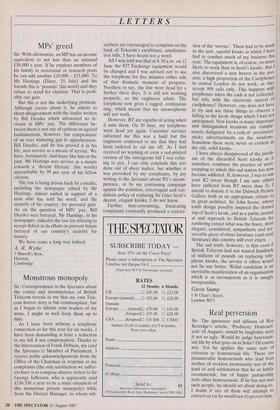Monstrous monopoly
Sir: Correspondence in the Spectator about the crimes and incompetence of British Telecom reveals to me that my own Tele- com horror story is but commonplace, but as I began to inform your readers of my woes, I might as well keep them up to date.
As I have been without a telephone connection so far this year for six weeks, I have been demanding at least a reduction in my bill if not compensation. Thanks to the intervention of Frank Dobson, my (and the Spectator's) Member of Parliament, I receive polite acknowledgements from the Office of the Chairman in response to my complaints (the only satisfaction we suffer- ers have is to compose abusive letters to Sir George Jefferson, who is apparently paid £136,338 a year to be a mute ornament of this monstrous private monopoly) while from the District Manager, to whom sub- scribers are encouraged to complain on the back of Telecom's exorbitant, uninforma- tive bills, I have heard not a word.
All I was told was that at 8.30 a.m. on 12 June the 837 Exchange equipment would be changed and I was advised not to use the telephone for five minutes either side of that dramatic moment of progress. Needless to say, the line went dead for a further three days. It is still not working properly, as the engineers admit. The telephone now gives a ragged, continuous ring, which means that my answerphone will not work.
However, BT are capable of acting when it suits them. On 30 June, my telephone went dead yet again. Customer services informed me this was a fault but the engineers confessed to me that they had been ordered to cut me off. As I had received no warning or even a red-printed version of the outrageous bill I was refus- ing to pay, I can only conclude this was done out of sheer malice, but whether it was provoked by my complaints, by my writing to the Spectator about BT's incom- petence, or by my continuing campaign against the pointless, extravagant and van- dalistic policy of replacing Sir Giles Scott's decent, elegant kiosks, I do not know.
Further time-consuming, frustrating complaints eventually produced a restora-
tion of the 'service'. These had to be made in the new, squalid kiosks in which I have had to conduct much of my business this year. The equipment is, of course, no more likely to work than in Scott's kiosks. But I also discovered a new horror in the pro- cess: a high proportion of the Cardphones in central London do not work, as they accept 999 calls only. This happens with payphones when the cash is not collected: but why with the electronic marvel of cardphones? However, one does not have to try and use these things to observe a failing in the kiosk design which I had not anticipated. New kiosks ;n many important and distinguished locations are conspic- uously disfigured by a rash of prostitutes' sticky advertisements on the windows. Somehow these were never so evident in the old, solid kiosks.
I have always disapproved of the purch- ase of the discarded Scott kiosks as it somehow condones the practice of asset- stripping to which this sad nation has now become addicted. If, however, I was to win your K2 (even though I am sure others have suffered from BT more than I), I intend to donate it to the Dulwich Picture Gallery both as an appropriate tribute to its great architect, Sir John Soane, whose tomb design possibly inspired the domed top of Scott's kiosk, and as a public protest at and reproach to British Telecom for rendering extinct what was the finest, most elegant, considered, sympathetic and ser- viceable piece of street furniture (and rural furniture) this country will ever enjoy. The sad truth, however, is that even if British Telecom had not wasted hundreds of millions of pounds on replacing tele- phone kiosks, the service it offers would not be any better. Wilful vandalism is an inevitable manifestation of an organisation which is as incompetent as it is smugly irresponsible.
Gavin Stamp I St Chad's Street, London WC1


















































 Previous page
Previous page